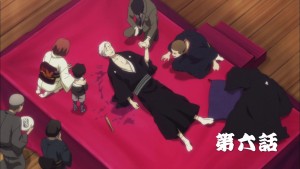 I sheepishly confess, I took a certain pleasure in Hii-sensei reading back pretty much everything I said about Yotarou in my “Rakugo” post last week… Not that it was all that hard to puzzle out, mind you, but it’s awfully nice when a show you love follows the course you’ve laid out for it in your mind. There’s a majestic beauty to the superstructure of a really good story, and Shouwa Genroku Rakugo Shinjuu is a really good story.
I sheepishly confess, I took a certain pleasure in Hii-sensei reading back pretty much everything I said about Yotarou in my “Rakugo” post last week… Not that it was all that hard to puzzle out, mind you, but it’s awfully nice when a show you love follows the course you’ve laid out for it in your mind. There’s a majestic beauty to the superstructure of a really good story, and Shouwa Genroku Rakugo Shinjuu is a really good story.
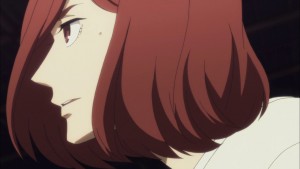 Stories are what this series is really about – of the people who comprise it, and the stories within it. Yakumo’s has been the story that was the spine of all the others, so when he collapsed on stage that was a narrative earthquake of the highest importance. Yet an audience remains in place, and they’ve come to Japan’s supreme temple of traditional arts to see a performance. “The show must go on”, as they say – and I’m convinced that’s what the semi-conscious Yakumo was trying to say to Yota-chan as he was bundled onto a stretcher. I knew in that moment Yotarou would perform “Inokori” – and what’s more, it feels to me as if it was the right thing to do.
Stories are what this series is really about – of the people who comprise it, and the stories within it. Yakumo’s has been the story that was the spine of all the others, so when he collapsed on stage that was a narrative earthquake of the highest importance. Yet an audience remains in place, and they’ve come to Japan’s supreme temple of traditional arts to see a performance. “The show must go on”, as they say – and I’m convinced that’s what the semi-conscious Yakumo was trying to say to Yota-chan as he was bundled onto a stretcher. I knew in that moment Yotarou would perform “Inokori” – and what’s more, it feels to me as if it was the right thing to do.
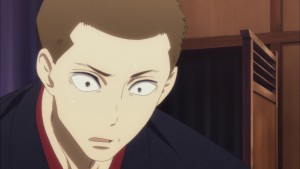 A part of me wonders if Yakumo might have tried to engineer this whole chain of events – to go out on-stage seems like an end he’d find amusing, and he’s clearly felt ready to die for a long time. But that’s probably too much of a poetic read – the old man can’t have known he’d see illusions in the incense smoke, of course, and I doubt he’d be OK with short-changing the ticket-holders of their grand finale. As is, he’s suffered a myocardial infarction (known to 99% of us as a heart attack) and it’s a good thing that Mangetsu (who you’ll recall never got in to see the Master before the show) had medical school training. Yakumo is whisked off with he and Konatsu to the hospital, and Yota stays behind to finish the show – or his part of it at least, “Inokori”.
A part of me wonders if Yakumo might have tried to engineer this whole chain of events – to go out on-stage seems like an end he’d find amusing, and he’s clearly felt ready to die for a long time. But that’s probably too much of a poetic read – the old man can’t have known he’d see illusions in the incense smoke, of course, and I doubt he’d be OK with short-changing the ticket-holders of their grand finale. As is, he’s suffered a myocardial infarction (known to 99% of us as a heart attack) and it’s a good thing that Mangetsu (who you’ll recall never got in to see the Master before the show) had medical school training. Yakumo is whisked off with he and Konatsu to the hospital, and Yota stays behind to finish the show – or his part of it at least, “Inokori”.
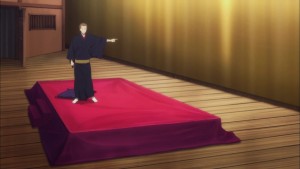 And what of Yo-chan’s “Inokori”, then? His style is different than his master’s, or his namesake’s. Yotarou is recognizably always Yotarou, but there’s a sense you’re never quite seeing all of him. And indeed you’d never mistake the Third-Generation Sukeroku for anyone else here, but there is something different to this performance. As are so many stage scenes in Shouwa Genroku, this one is incredibly tense. And somehow Yota is able to channel the desperation and anxiety he feels into his performance. Watching him perform “Inokori” this way one gets the sense that it’s the way it was written to be performed – and that, in a nutshell, is Yotarou’s gift.
And what of Yo-chan’s “Inokori”, then? His style is different than his master’s, or his namesake’s. Yotarou is recognizably always Yotarou, but there’s a sense you’re never quite seeing all of him. And indeed you’d never mistake the Third-Generation Sukeroku for anyone else here, but there is something different to this performance. As are so many stage scenes in Shouwa Genroku, this one is incredibly tense. And somehow Yota is able to channel the desperation and anxiety he feels into his performance. Watching him perform “Inokori” this way one gets the sense that it’s the way it was written to be performed – and that, in a nutshell, is Yotarou’s gift.
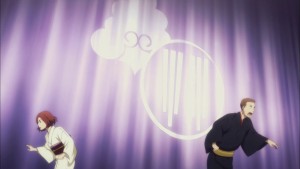 There’s something of a parallel between rakugo and classical music here, I think – the question of how much of himself or herself a conductor or soloist should put into an interpretation of a genius like Mozart or Chopin. I won’t repeat it here, but my spin on Yotarou last week eerily matches the third of Higuchi-sensei’s three forms of rakugo expression. Yakumo is a master craftsman, a technician – he uses rakugo the way a romantic pianist uses a Bechstein, to express his own soul. Sukeroku is, simply, Sukeroku. The rakugo is almost irrelevant for him – it’s a canvas on which he paints, but the entire experience is simply an extension of the man himself. That means he didn’t have versatility and range like Kikuhiko, but with the right material, he soared like a phoenix and left the audience in awe.
There’s something of a parallel between rakugo and classical music here, I think – the question of how much of himself or herself a conductor or soloist should put into an interpretation of a genius like Mozart or Chopin. I won’t repeat it here, but my spin on Yotarou last week eerily matches the third of Higuchi-sensei’s three forms of rakugo expression. Yakumo is a master craftsman, a technician – he uses rakugo the way a romantic pianist uses a Bechstein, to express his own soul. Sukeroku is, simply, Sukeroku. The rakugo is almost irrelevant for him – it’s a canvas on which he paints, but the entire experience is simply an extension of the man himself. That means he didn’t have versatility and range like Kikuhiko, but with the right material, he soared like a phoenix and left the audience in awe.
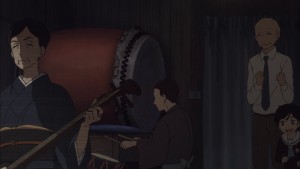 Yotarou is different. He is rakugo. “I complete forgot you were there. You were the world of “Inokori” itself. Free from ego or hunger, a vessel for pure rakugo. You don’t imbue your rakugo with how you feel. That is actually a tremendous strength.” Ironically, Yotarou is roughly the antithesis of the previous Sukeroku – rather than making the performance purely about himself, he makes it purely about the material. So in effect Yota-chan doesn’t discover his own rakugo through his performance – the audience discovers the true characters he plays through that performance.
Yotarou is different. He is rakugo. “I complete forgot you were there. You were the world of “Inokori” itself. Free from ego or hunger, a vessel for pure rakugo. You don’t imbue your rakugo with how you feel. That is actually a tremendous strength.” Ironically, Yotarou is roughly the antithesis of the previous Sukeroku – rather than making the performance purely about himself, he makes it purely about the material. So in effect Yota-chan doesn’t discover his own rakugo through his performance – the audience discovers the true characters he plays through that performance.
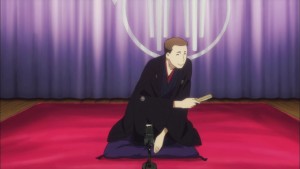 Yotarou doesn’t give the audience “Shinagawa Shinjuu” – in fact he doesn’t even give them an explanation, rushing off to the hospital as soon as his “Inokori” was done. And he proceeds to try and fill the Master’s shoes as best he can, which is no small task. As Kikuhiko lies unconscious Yotarou does his own performances and the old man’s besides, with nary a break. In very Yotarou fashion he holds an abiding faith that Yakumo will recover, without any basis in evidence. And he receives a rather startling bit of news from Hii-sensei after the professor nails his rakugo style – he may have found a film of the second Sukeroku performing. The work? “Shibahama”, which Shin performed in Episode 12 – a rare earnest tale from him, and most crucially the last one he performed before titular tragedy took place.
Yotarou doesn’t give the audience “Shinagawa Shinjuu” – in fact he doesn’t even give them an explanation, rushing off to the hospital as soon as his “Inokori” was done. And he proceeds to try and fill the Master’s shoes as best he can, which is no small task. As Kikuhiko lies unconscious Yotarou does his own performances and the old man’s besides, with nary a break. In very Yotarou fashion he holds an abiding faith that Yakumo will recover, without any basis in evidence. And he receives a rather startling bit of news from Hii-sensei after the professor nails his rakugo style – he may have found a film of the second Sukeroku performing. The work? “Shibahama”, which Shin performed in Episode 12 – a rare earnest tale from him, and most crucially the last one he performed before titular tragedy took place.
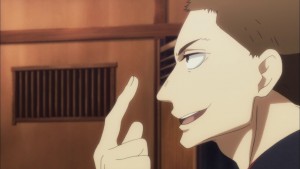 Whether what Higuchi has found is that performance I don’t know, but I suspect it is – and it will obviously be a crucial watershed moment for all of the cast. Kikuhiko has awoken a last, and with tears in his eyes. The old man seems disappointed to find himself still in this world, and seeing the spectre of Shin performing again is sure to convince him even further that he’s already a ghost, a shadow rather than a truly living, breathing man. There’s a great deal of peace that still needs to be made all-around – amongst the cast, and with the medium of rakugo itself. Yakumo is much loved – by the rakugo world, by his protege, by Shinnosuke – and by Konatsu too, as her reaction to his illness (and awakening) proves. But until he ceases to hate himself for what he believes he’s done, none of that peace can ever happen.
Whether what Higuchi has found is that performance I don’t know, but I suspect it is – and it will obviously be a crucial watershed moment for all of the cast. Kikuhiko has awoken a last, and with tears in his eyes. The old man seems disappointed to find himself still in this world, and seeing the spectre of Shin performing again is sure to convince him even further that he’s already a ghost, a shadow rather than a truly living, breathing man. There’s a great deal of peace that still needs to be made all-around – amongst the cast, and with the medium of rakugo itself. Yakumo is much loved – by the rakugo world, by his protege, by Shinnosuke – and by Konatsu too, as her reaction to his illness (and awakening) proves. But until he ceases to hate himself for what he believes he’s done, none of that peace can ever happen.


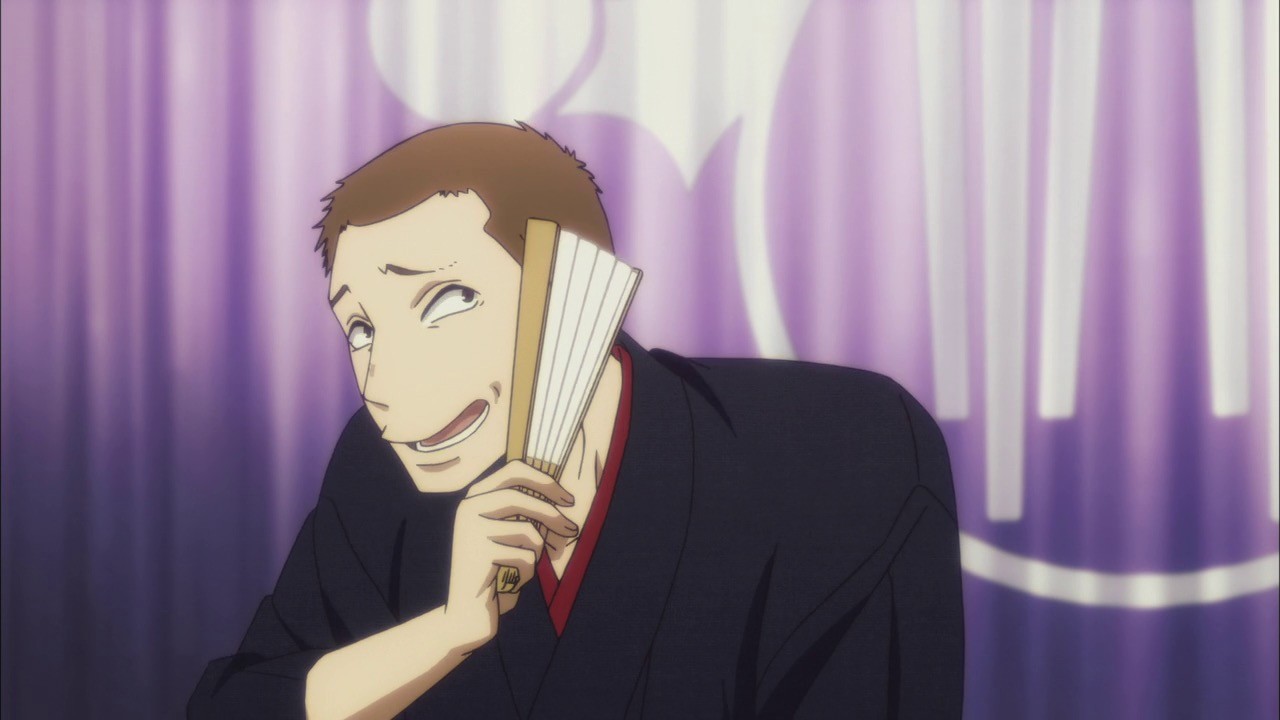
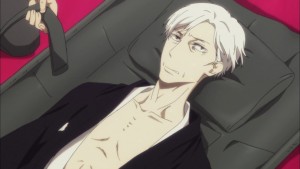
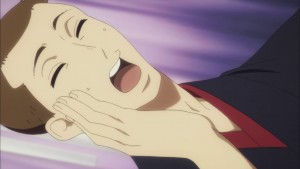
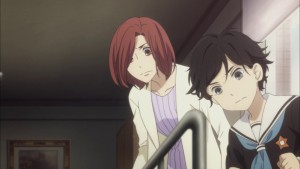
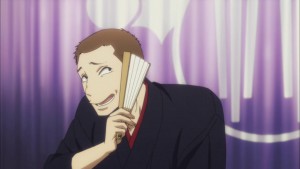
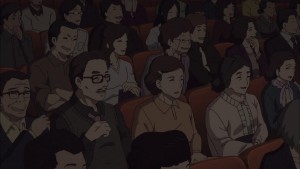
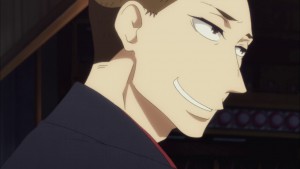
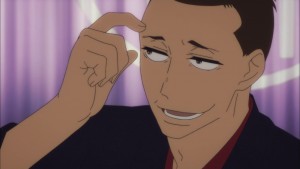
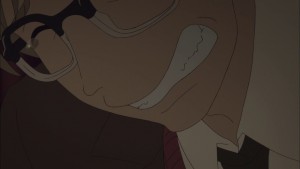
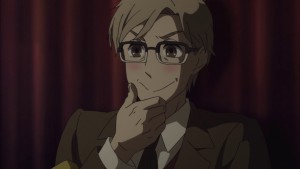
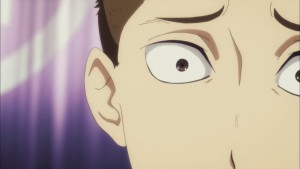
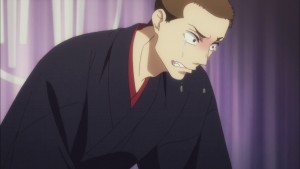
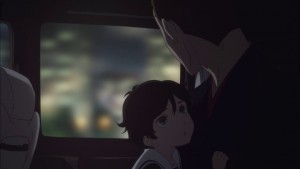
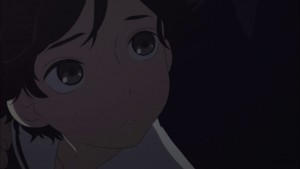
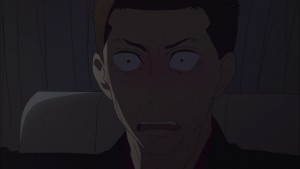
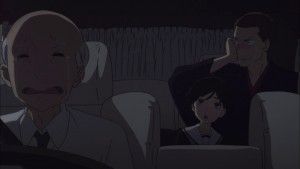
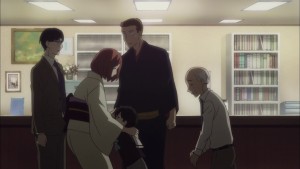
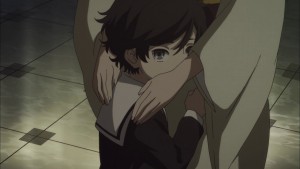
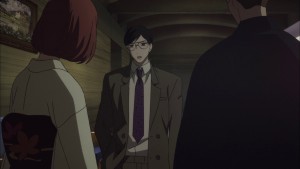
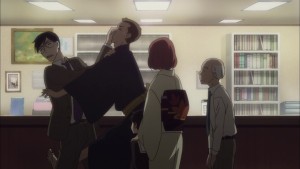
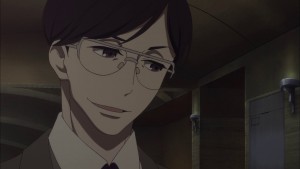
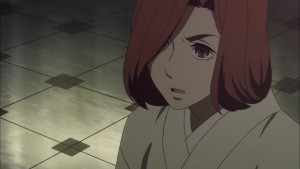
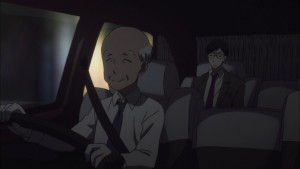
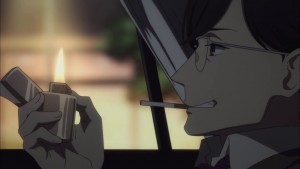
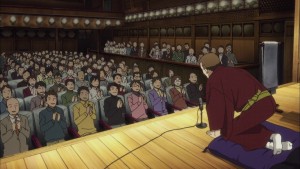
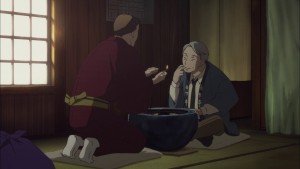
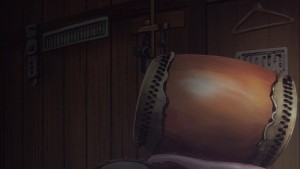
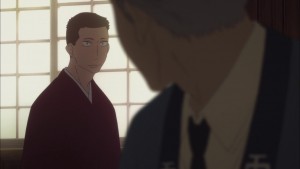
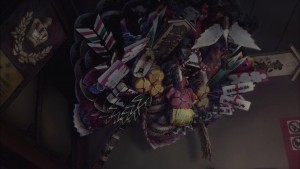
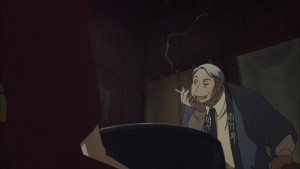
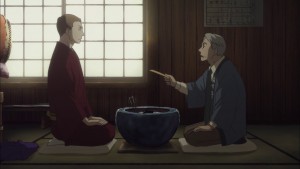
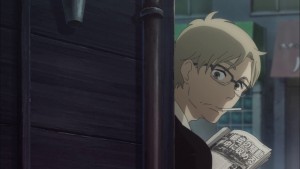
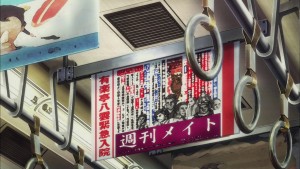
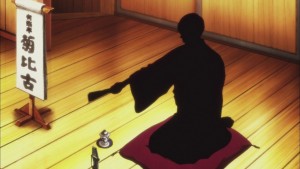
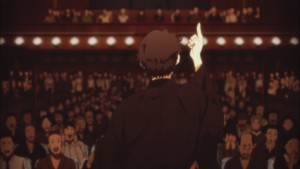
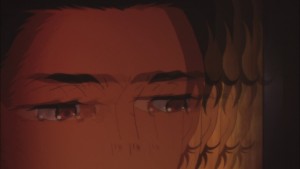
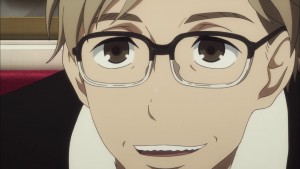
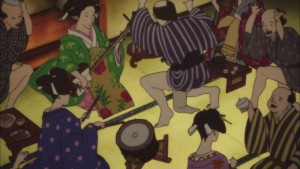
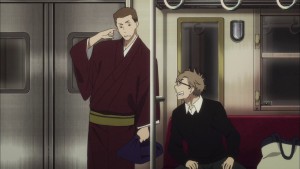
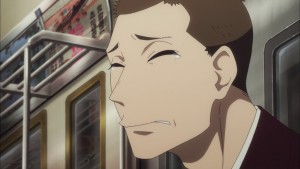
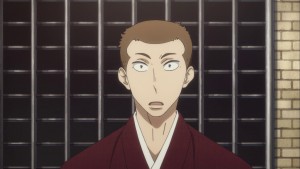
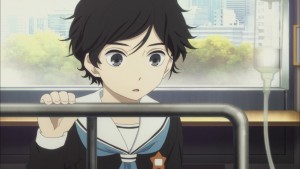
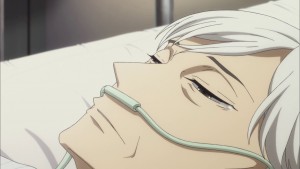
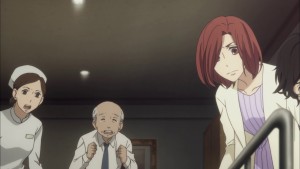
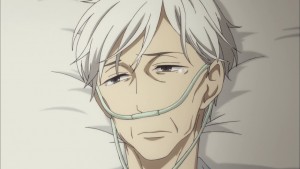
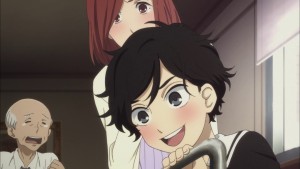
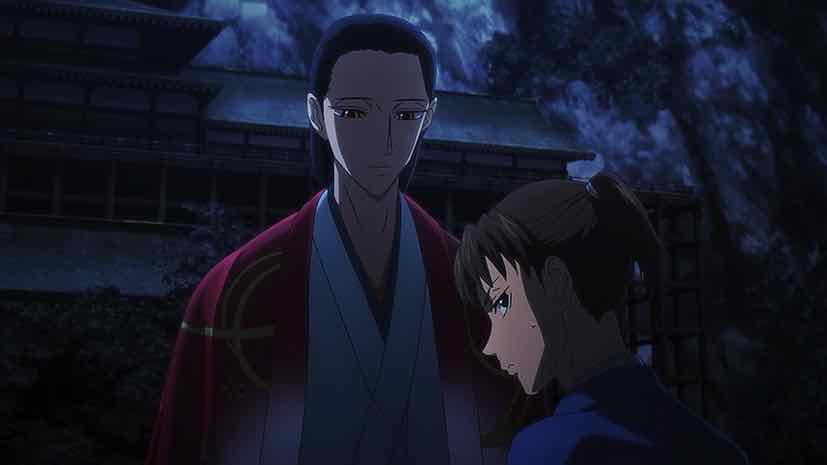
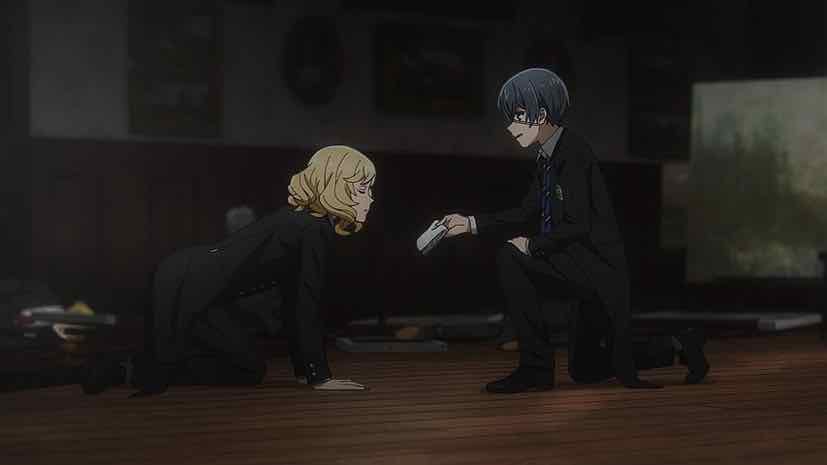
sweejen
February 10, 2017 at 9:03 pmI thought of your analysis from last week while I was watching today, too!
Christine
February 11, 2017 at 3:50 pmI thought I had a sense of deja vu when Hii-sensei started explaining his theory to Yota! You hit this one right on the nail. Now we just need Yakumo to claw his way out of his self-loathing and then we can call it a day.
Mr. Braun
February 19, 2017 at 2:17 amWhat form of expression do you think Shouwa Genroku predominantly uses?
Sukeroku’s form is, I think, out of the question; this show isn’t just an extension of its author’s voice. Between Yakumo’s master craftsmanship and Yotaro’s pure vessel for the medium, I think Yakumo’s is more likely. But it’s also interesting to argue that the deep character relationships and interactions we see on the screen are portrayed so effectively because the author selflessly lets them express themselves, rather than expressing his own voice.
Guardian Enzo
February 19, 2017 at 8:33 amThat’s a really interesting question, but I’m not sure I could take a stab at answering it without a little clarification. Are you asking whose rakugo style closest approximates that of the mangaka herself?
If so, I would agree it’s not Shin. A hybrid of Bon and Yotarou might be pretty close. But don’t forget Yuurakutei – to some extent, I think his is a hybrid of Kikuhiko and Yotarou.
Mr. Braun
February 20, 2017 at 10:44 amYes, that was exactly my question.
Hmm, I really didn’t think about Yuurakutei at all. An interesting answer.
I really need to rewatch his scenes before making a call though; don’t remember them all that much.